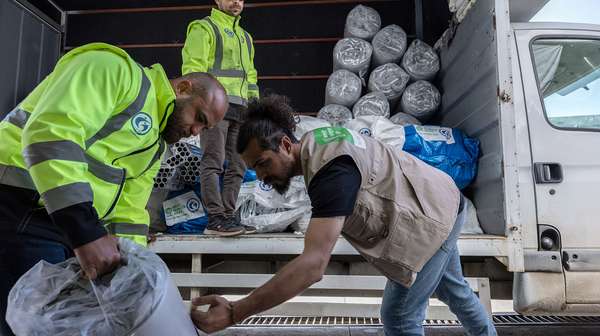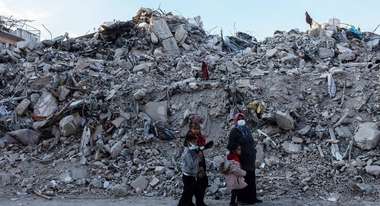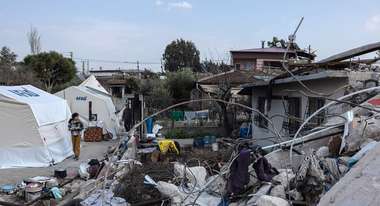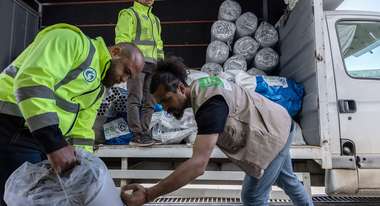From our central warehouse in Gaziantep, we deliver relief supplies to families in Syria and Türkiye. Our logistics staff give a glimpse behind the scenes of the complex process.
6 Months after the Earthquake in Türkiye and Syria: Our work continues
On 6 February 2023, several earthquakes shook south-eastern Türkiye and north-western Syria. In the six months since the devastating disaster, Welthungerhilfe (WHH) has been able to support more than 120,000 affected people with vital relief supplies – and our work continues.
The memory of the night of 5-6 February 2023 will be a traumatic one for millions of people in south-eastern Türkiye and north-western Syria. A 7.8 magnitude quake shook the region. In the days and weeks that followed, a total of 25,000 aftershocks followed. Millions of people lost their homes, over 56,000 people died. Our team was also affected by the earthquake disaster. Two colleagues sadly lost their lives in Hatay, many have lost family and friends. The emotional and professional strain was enormous for the entire team in Türkiye and Syria – but for all of them, it was nevertheless clear: we want to support the people who have lost everything and are now facing nothing as quickly as possible.
Rapid support after the quake
The situation was dramatic: Over two million people were left homeless by the quake; many didn't know where they could sleep. It was winter and very cold. In several of our project locations, including Hatay and Mardin, relief supplies such as hot meals, food and drinking water, tents, blankets and heating material were distributed immediately.
In the aftermath of the earthquake, Seda Sertdemir, Head Office in Mardin, shared her testimony of the initial response:
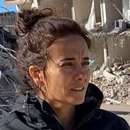
We immediately contacted our local partners and government institutions in Mardin and neighboring provinces to begin the planning process. Our primary focus was to provide hot meals and address the urgent need for clothing and shelter due to the severe weather conditions. We worked with all of our resources to reach as many people as possible; we slept in cars to be close to the areas and maximize our ability to reach people.
Seda Sertdemir WHH Head Office in Mardin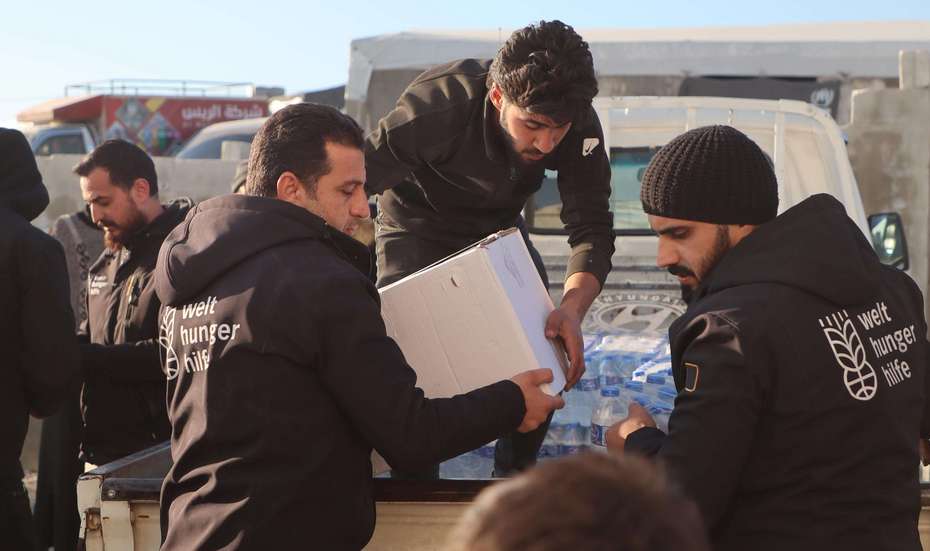
From the beginning, we worked closely with partner organizations and government agencies to ensure the supply of essential goods to the affected population. Within WHH, colleagues from Germany, Türkiye and Syria closely coordinated emergency aid activities . The situation was particularly precarious in north-west Syria after the earthquake disaster. Mustafa Alkhonous, Field Expert, who works at one of WHH’s offices in Syria, highlights the challenging circumstances they faced after the earthquake.
Mustafa Alkhonous, an expert in one of Welthungerhilfe's offices in Syria, describes the difficult circumstances after the earthquake:
We witnessed solidarity here. Some of our colleagues lost their families, but everyone returned to work as soon as possible. The situation in Syria was already sensitive before the earthquake, and the earthquake made it more difficult.
Mustafa Alkhonous WHH SyriaExpanding the Response Efforts
To expand the response across the region, WHH established emergency containers in Adıyaman, Gaziantep, Hatay and Kahramanmaraş to increase its response capacity. In the affected communities in northwest Syria, we have worked with partner organisations to provide cash assistance, food, water, sanitation and hygiene (WASH) and rehabilitation services. WHH has assisted more than 70,000 people in Türkiye and 50,000 individuals in Northwest Syria.
As the initial challenge subsided, WHH shifted its focus to planning for the long-term recovery and rehabilitation of affected communities. We developed strategies that included livelihoods and WASH programs, especially for people living in temporary shelters because their houses were no longer habitable.
Support in coping with the consequences of the earthquake
We want to continue to stand by the people affected by the earthquake disaster, to develop sustainable livelihood initiatives together with them and to support them in coping with the consequences of the earthquake. WHH will continue its work in Türkiye in the near future with the following focal points:
- Providing basic needs such as multi-purpose cash, food, water, shelter (tents and containers)and non-food items to affected communities will continue to be a priority.
- Livelihoods: In order to restore self-sufficiency, WHH will provide vocational training, support for small businesses and agricultural assistance for farmers to increase the availability of nutritious food.
- WASH: WHH prioritizes clean water, sanitation, and hygiene by distributing hygiene kits and by installing water tanks and latrines, all aimed at ensuring public health.
- Psychosocial Support: WHH and partners will provide psychological support and services to help people cope with the trauma caused by the earthquake. WHH is planning to address protection risks faced by vulnerable individuals and communities affected by the earthquake.





